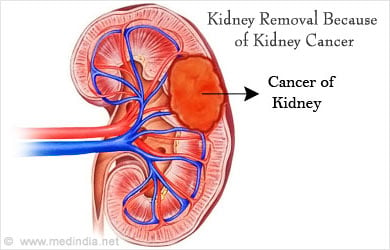- Yalavarthy R, Parikh CR. Congenital Renal Agenesis: A Review. Saudi J Kidney Dis Transpl [serial online] 2003 [cited 2015 Apr 18];14:336-41.
- "Diet and Lifestyle Changes - National Kidney Disease Education Program (NKDEP)." National Kidney Disease Education Program (NKDEP). Web. 18 Apr. 2015.
- "Solitary Kidney." Johns Hopkins Children's Center. Web. 18 Apr. 2015.
What is Solitary Kidney?
Solitary kidney is not a disease, but it is as the name suggests, it is the condition of having just one functional kidney. This could be on account of a birth defect or because of the loss of one kidney due to a disease or because the individual has donated one of their kidneys for transplant. The kidneys are vital organs and perform the important functions of blood purification of wastes and regulation of total body water content. Kidney function is also essential to maintain the proper balance of minerals in the blood like potassium, calcium, sodium and phosphorus. The functioning of the kidneys also affects blood pressure, bone health and hormone production. In just one day, the kidneys filter about 115 to 140 liters of blood, producing about 1 to 2 liters of excess fluid and wastes as urine. The urine moves to the bladder from the kidneys via tubes called the ureters and it is stored there until eliminated from the body during urination.
Most healthy individuals are born with two kidneys, but there may be problems with fetal development resulting in the development of just one kidney at birth, a condition called renal agenesis. Renal agenesis doesn’t always imply that the individual will have solitary kidney however, as there are cases where both kidneys do not develop, but without any kidney function a baby will unfortunately not survive. The first type of renal agenesis is called unilateral renal agenesis, while the latter is called bilateral renal agenesis. In other instances of solitary kidney at birth itself, both the kidneys will develop, with only one being functional, which is a condition called renal dysplasia.

Solitary kidney is not a life threatening condition and most people with one functional kidney will continue to lead normal and healthy lives. It does not affect the quality of life, although it becomes more important to maintain a healthy lifestyle. In some cases, individuals may experience a few complications like reduced kidney function and hypertension.
What are the Causes of Solitary Kidney?
The causes of solitary kidney can vary widely and very often they remain unknown. Depending on the type of solitary kidney condition the causes could include any of the following:
Congenital
The development of renal agenesis is not always explicable and it does not result from any action of the mother during pregnancy. It is also unlikely that there will be any such problem in future pregnancies.
The condition occurs when the uretic or kidney bud does not develop as is normal during the early stages of fetal growth. Although we still do not have a clear understanding of why this occurs, this condition like many other congenital kidney defects are likely to be related to genetic mutations. These are not inherited genetic mutations, but are the result of naturally occurring mutations.
Kidney Removal
In some individuals, one kidney may fail or suffer damage or scarring due to some disease or because of cancer of the kidney. In such cases a nephrectomy, which is a surgical procedure to remove the kidney, may be necessary. The kidneys can also suffer damage on account of an injury such as from an accident and in some cases the kidney may have to be removed.

Kidney Donation
The practice of donating organs while alive is becoming increasingly common and a lot more people come forward to donate one of their kidneys when there is a family member or friend who requires a kidney transplant.
What are the Symptoms of Solitary Kidney?
Solitary kidney usually does not cause any symptoms as the single kidney is still completely function and able to meet your body’s requirements. When it does affect your health the changes are extremely gradual and small, and may go unobserved. With the passage of time however, these changes buildup and the effects can have greater consequences requiring medical treatment. Some of the changes or symptoms of solitary kidney could include:
Hypertension – Hypertension or high blood pressure tends to develop in individuals with just one kidney because of the role the kidneys in maintaining healthy blood pressure. The kidneys normally help by regulating the balance of fluid in the bloodstream and also through the production of renin, which is a hormone that works along with other hormones to regulate the expansion or contraction of blood vessels.
Proteinuria – The presence of excessive amounts of protein in the urine is generally indicative of kidney damage and the condition is referred to as proteinuria. Individuals with solitary kidney may be found to have mildly elevated levels of protein in urine after living with one kidney for several years.
Reduced Glomerular Filtration Rate (GFR) – Glomerular filtration rate reflects the efficiency of the kidneys in the removal of wastes from the bloodstream. There is a reduction in the efficiency of waste removal in individuals with just one kidney and regular monitoring is essential. As long as the condition of reduced GFR is kept under control it will not have any significant impact on overall health.
While solitary kidney does not have a significant effect on health and your quality of life, there is some risk of solitary kidney complications developing and regular monitoring of blood pressure, GFR and proteinuria are absolutely essential. With regular monitoring and a healthy lifestyle there should be no other symptoms.

The threat of kidney failure or damage to the kidney is obviously more threatening and should be a bigger cause for concern to anyone with solitary kidney. It is therefore important that you are wary about any of the symptoms of kidney failure. These can include:
- Swelling of the ankles or in the facial region
- Changes in urine flow and cloudy or dark urine
- Changes in sensation of taste
- Fatigue, exhaustion and nausea or vomiting
- Loss of sensation in the extremities like the toes or fingers
If you do experience any symptoms of kidney failure make it a point to consult your doctor immediately.
How to Diagnose Solitary Kidney?
When solitary kidney is present from birth, doctors can usually make a diagnosis during the prenatal stages itself. The condition may be detected before the 20th week in an antenatal ultrasound scan. In other cases, the condition could be detected soon after birth.
In many instances however, the condition goes undiagnosed as there are no ill effects experienced by the patient. Later in life the condition is only detected as symptoms like hypertension, high proteinuria levels and reduced GFR are observed. The condition is also diagnosed sometimes purely by accident when one goes in for an ultrasound or x-ray.
In the case of solitary kidney, tests are more important for monitoring the condition rather than for its diagnosis.
What is the Treatment for Solitary Kidney?
Solitary kidney is not a health condition or disease that requires treatment, but the presence of just one functional kidney does increase the risk of kidney failure and related complications. For this reason it is best for individuals with solitary kidney to follow a healthy lifestyle, which includes diet, activity and safety and regular health checks.
Diet
Although there is no special diet requirement it is best to make certain dietary modifications to restrict or prevent the onset and progression of kidney disease. Try to restrict your sodium intake by avoiding processed, prepared and junk foods. Try to use fresh foods instead of canned and processed varieties and substitute salt in cooking with spices, herbs, and sodium-free seasonings. If you must consume frozen meals or pre-cooked dinners opt for low sodium variants. When using canned foods like beans, fruits or vegetables make it a point to rinse them out before consuming. Restrict your protein intake and opt for healthier low fat sources of protein. Avoiding excess sugar and overeating will reduce the risks of diabetes and obesity leading to the Metabolic Syndrome, both of which can damage a solitary kidney over time.

Control Blood Pressure
In addition to a healthy diet you should avoid smoking and the excessive consumption of alcohol. Make it a point to follow a heart healthy diet and keep a check on your cholesterol levels. Doctors may also need to prescribe medications to regulate blood pressure levels.
Safety
It is essential that you take precautions to avoid any injury to the kidneys from both medications and sports activities. Certain medications put a strain on the kidneys and can cause kidney damage which is why it is important that you inform your health care providers about your condition before beginning any treatment. Physical activity is important to your general health and wellbeing but it’s important to play it safe. Contact sports should be avoided and try use protective equipment when participating in sports activities.







